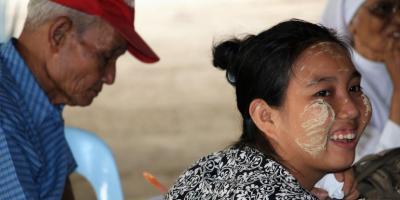
John Pearson, former Director of Prosecutions for the Ontario Attorney General’s Ministry in Canada, worked with IDLO supporting the Myanmar Union Attorney General’s Office. He spoke to Victoria Harrison Neves, Strategic Communications Adviser, about his experience in the country.
IDLO: This is a crucial time of transition for the new government in Myanmar, how important is the rule of law to contributing to peace and stability during this period of uncertainty and change?
John Pearson: The rule of law will play a fundamental role as Myanmar embarks on a challenging future of political and economic reform. But the rule of law required will not be the rule by law used in the past to benefit the powerful and corrupt. Rather, it must be the foundation for a system of rules that increase legal certainty, keeps people safe, protects their fundamental rights, and helps them prosper economically.
IDLO: Can the rule of law make a difference for ordinary people in Myanmar?
JP: The first step in making a difference for ordinary people is to replace the rule of men by the rule of law. This opens up the possibility that ordinary people have a legal remedy when their rights have been violated. Whether they can make effective use of these rights is dependent on the degree to which they are made aware of their rights (IDLO’s Rule of Law Centres play an important role in this regard) and whether fundamental rights are available in practice as well in law.
IDLO: When you took on this role, what were you expecting?
JP: While I really did not know what to expect, I thought the work would entail more human rights advocacy than it did. By the end of my time with IDLO, however, I came to appreciate that supporting and encouraging achieves more than criticizing.
IDLO: With so many challenges to consider, which areas did you focus on in your work with the Attorney General’s Office?
JP: I focused on training the trainers of the UAGO to use adult education principles in training law officers on fair trial standards; supporting the UAGO trainers in presenting training sessions in locations around the country using adult education principles; updating a manual for UAGO law officers on fair trial standards; and drafting a training needs assessment to address the new requirements of the UAGO.
IDLO: Where do you think the most progress was made?
JP: I feel the most difference was made during our workshops outside of the headquarters of the UAGO. The majority of UAGO law officers prosecute in small offices under less than ideal conditions. We were accompanied by UAGO senior officials. Regional Advocates General participated in the workshops. This helped stress to law officers the importance that the UAGO and the regional AGs attach to implementing fair trial standards.
IDLO: From your experience, what do you think IDLO specifically brought to this relationship and work?
From everything I observed, IDLO enjoys an enviable international reputation because of its history and non-aligned status.
JP: The rule of law can be a theoretical, vague and somewhat elusive concept unless a practical, grass-roots focus is maintained. As a result of its experience, IDLO understands this crucial principle. From a personal perspective, this was my first extended overseas contract. I learned a great deal from the experienced IDLO people with whom I worked. The head office of IDLO also provided valuable support. From everything I observed, IDLO enjoys an enviable international reputation because of its history and non-aligned status.

